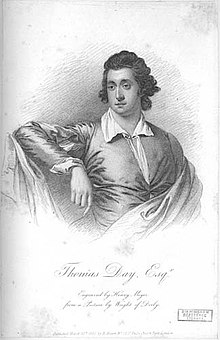Thomas Day
Thomas Day (born June 22, 1748 in London , † September 28, 1789 in Barehill , Berkshire) was an English writer and political essayist. He is considered to be one of the most important representatives of Rousseault's ideas of a natural form of society in early industrial England.
As the only son of a wealthy estate owner, whom he inherited at the age of one, Day never suffered economic hardship. In line with his nature, however, Day made an active effort from an early age - allegedly as a child - to achieve social balance and individual well-being within his personal environment. As a teenager, reading Jean-Jacques Rousseau's novel influenced Emile Day to a great extent: he developed into an enthusiastic supporter of Rousseau's ideas of natural, "free" society and education. Like Rousseau, he began to write books and novels that became very popular in early industrial English society and there contributed decisively to the spread of Rousseau's ideas.
From his close friend and Oxford classmate Richard Lovell Edgeworth , Day had been introduced to the newly founded circle of the Lunar Society in 1766 , in whose circle he was a regular participant from 1770 after his move to Lichfield. Here, together with Edgeworth, he influenced the liberal members who were open to new ideas through his convictions and was thus one of the pioneers for Matthew Boulton's consciously humane design of his factory Soho Manufactory and his introduction of a first social security.
Day also tried to make his ideas of education and free thinking come true. When, after the death of his first wife, he could not find a woman who met his expectations of an educated woman with equal rights, he took two orphaned girls into care in 1769 , whom he trained according to his own ideas in order to later marry one of the two. But there was never a marriage with one of these girls; the experiment was ended in 1778 when he married Esther Millner.
Also in 1778 Day joined the anti-slavery movement, which found in him one of its most prominent members. Day's poem The Dying Negroe , which he co-wrote with John Bicknell , became one of the most famous anti- slavery works of his time . He was also involved in fundamental issues of British politics and supported the American independence movement.
Day died on September 28, 1789 of a head injury sustained in a riding accident, shortly before the publication of the last volume of his children's novel Sandford and Marton , which is still read in Great Britain and is now considered his best-known work. His grave is unknown; probably under one of the oak trees on his Anningsley estate. Day's wife, Esther, died two years after Day's death.
Works (selection)
- The Dying Negro (1773)
- Reflexions upon the Present State of England (1782); later appeared as Letters from Marius
- Sandford and Merton (1783–1789)
literature
- Johann Jacob Carl Timaeus: Life Thomas Day, Esq. one of the noblest men of our century: along with his poem: The dying negro . Heinicke & Hinrichs, Leipzig 1798.
- Jenny Uglow : The Lunar Men . 2nd Edition. Faber and Faber, London 2003, ISBN 0-571-21610-2 .
Individual evidence
- ^ As Anne Seward reports in her memoir, his regular annual income was £ 1,200; Jenny Uglow: The Lunar Men . 2nd Edition. Faber and Faber, London 2003, ISBN 0-571-21610-2 , pp. 184 .
Web links
- SUB Goettingen
- Biography at RevolutionaryPlayers.org (in English)
- The dying negroe. Digitization and transcription of the poem. (in English)
| personal data | |
|---|---|
| SURNAME | Day, Thomas |
| BRIEF DESCRIPTION | English writer and political essayist |
| DATE OF BIRTH | June 22, 1748 |
| PLACE OF BIRTH | London |
| DATE OF DEATH | September 28, 1789 |
| Place of death | Barehill , Berkshire |
